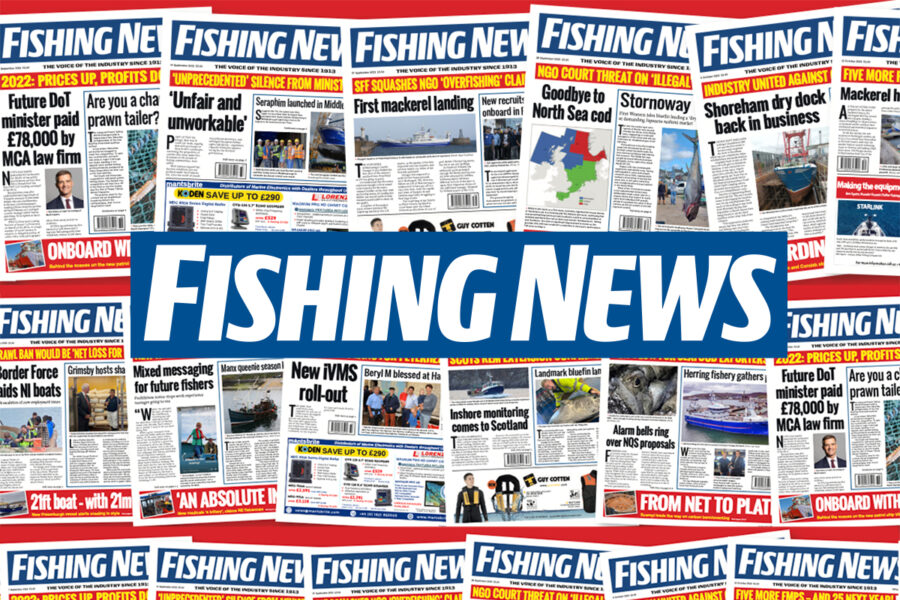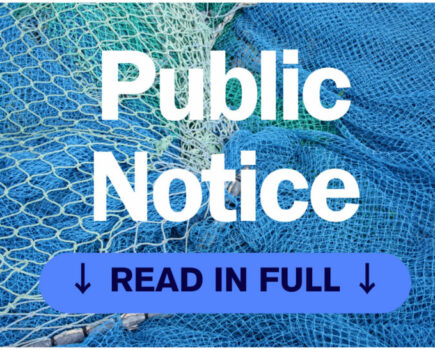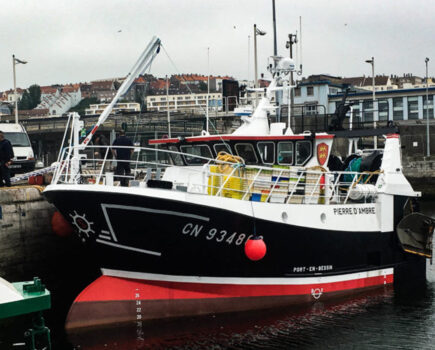HPMAs, crew visas, medical certification, Fisheries Management Plans: the pages of FN have charted another challenging year for the industry
By Gaby Bartai
After three years in which the industry’s fortunes were dominated by external events – Covid, Brexit and the war in Ukraine – 2023 saw the focus shift, with this year’s big stories generated by marine and industry (mis)management.
Spatial squeeze continued to exert pressure, with Highly Protected Marine Areas (HPMAs) setting up an entirely unhelpful binary between fishing and marine protection. Fisheries Management Plans (FMPs) added to the workloads of industry representatives, but with the early plans long on principle and short on practical detail, may make little actual difference for fishing business in the short term.
At a grassroots level, positive examples abounded of growing co-operation between scientists, fisheries managers and fishermen – many of them documented in our pages in 2023 – but the year was also marked by a growing disconnect between the authorities and those whose lives are governed by their decisions.
The long-running sagas of ML5 medical certification and English iVMS implementation, and the Home Office’s disregard of the real-world implications of its visa decisions for fishing crew, stand as examples of – to borrow a phrase used by SNP leadership hopeful Kate Forbes of the Scottish HPMA debacle – ‘how not to do government’.
January
The year opened with mostly positive news on 2023 TACs, with the deal between the UK and EU for 69 shared stocks signed off just before Christmas, following an agreement with the EU and Norway that had brought good news on North Sea cod.
Many demersal stocks saw significant increases, and the anticipated monkfish cuts were less than had been feared. But South West industry leaders said the region stood to lose over £2m from the deal, with cuts in key stocks including pollack, sole, plaice and haddock, and a three-month delay to the reopening of the spurdog fishery.
Fishermen in the North East of England called for a judicial review of the MMO’s licensing of dredging in Teesside, with the mass die-offs of shellfish that began in September 2021 continuing to devastate fishermen’s livelihoods.
A meeting with immigration minister Robert Jenrick raised ‘cautious optimism’ about a flexible approach to the transition from transit to skilled worker visas for overseas crew.
A police investigation was launched into the December 2022 loss of the Jersey vessel L’Ecume II, which sank after colliding with a ro-ro ferry with the loss of her three crew. The search for the body of skipper Michael Michieli continued.
Fifty-seven Irish vessels were offered decommissioning under the Brexit Adjustment Reserve scheme – on terms condemned as ‘an absolute scandal’ by industry leaders.
Brixham announced another record-breaking year in 2022, smashing its previous £43.6m record – set only the previous year – with a new high of £60.8m.
February
The panel of independent experts appointed by Defra to assess possible causes for the North East shellfish die-offs delivered its verdict. Its report said it was unlikely that either an algal bloom – Defra’s favoured theory – or toxic chemicals such as pyridine – the explanation advanced by scientists working alongside North East fishermen – were the cause, suggesting instead a ‘novel pathogen’.
Fishermen responded by saying that if such a pathogen did exist, urgent investigation was needed – but the month concluded with Defra closing its file on the die-offs, with secretary of state Thérèse Coffey saying ‘it is highly unlikely that we will find the cause and so no further analysis will be undertaken by the government’.
Meanwhile, in the North East, the repercussions continued. “Sealife is declining, fishing industry jobs are being lost, and boats are being forced to the wall,” said Hartlepool fisherman Stan Rennie – and in FN, Durham academic Dr John Bothwell took a coruscating swipe at Defra’s ‘science’ in an article that clocked up over 30,000 views online.
An attempt to introduce new auction rules at Peterhead sparked a buyer boycott – and resulted in Peterhead Port Authority agreeing to a delay.
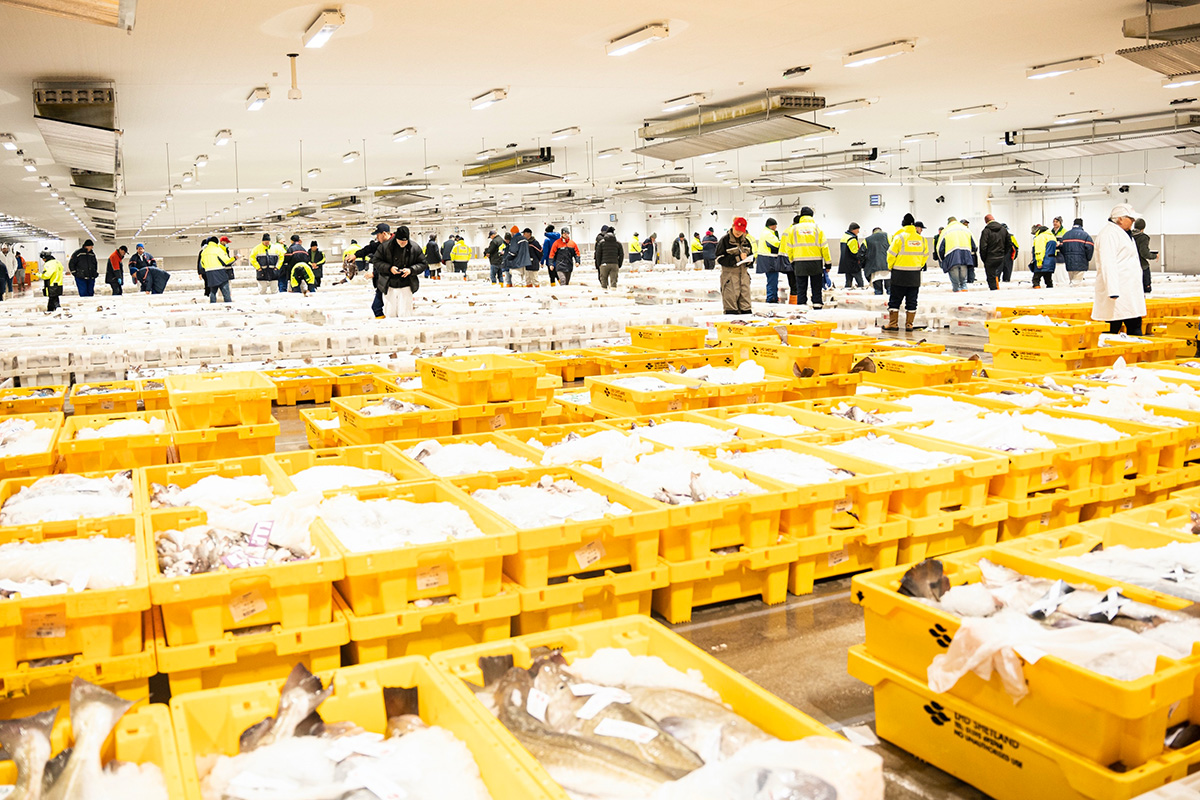
Peterhead fishmarket hit the headlines in January when Peterhead Port Authority’s attempt to impose new auction rules, including an end to bid sharing, sparked a buyer boycott.
Solent netters mounted a campaign against a proposed new Southern IFCA byelaw, ostensibly to protect salmonids, that they said posed an existential threat to their livelihoods.
Crewman Madis Letsars, aged 37, died after going overboard from the crabber Séimi WT 388 off the coast of Co Donegal.
March
The first HPMAs in English waters were confirmed – with the proposed Lindisfarne site, against which the local industry had bought a spirited campaign, spared. The handling of the announcement sparked controversy, with the local Conservative MP leaking news of the Lindisfarne reprieve before the decision was officially confirmed.

Lindisfarne fishermen with Canon Dr Sarah Hills, following the successful campaign against the proposed designation of Lindisfarne as a pilot English HPMA.
In one of 2023’s emerging big stories, Western Isles Council Comhairlie nan Eilean Siar, Shetland’s seafood industry and the SFF came out in opposition to the Scottish government’s HPMA proposals, under which 10% of Scottish waters would have been closed to fishing.
The HPMA row erupted within the SNP government at the end of the month, with Kate Forbes, one of the three candidates vying to succeed Nicola Sturgeon as first minister, coming out against the proposals.
The appointment of Virginia McVea as the new CEO of the MCA raised short-lived hopes of a new era of improved relations between the agency and the industry. In what would become another of the year’s main stories, NUTFA received over 500 responses to its call for fishermen to get in touch with concerns about the MCA’s new medical certification requirements, which would require all fishermen to be in possession of an ML5 or ENG1 by the end of November.
It was announced that 42 Irish vessels had accepted their decommissioning offers – while in Holland, 70 vessels were to be scrapped in a similar scheme, designed to bring fleets back into line with available quota following the Brexit TCA.
Grimsby Town’s historic FA Cup run, bolstered by their iconic Harry Haddock mascots, saw them reach the quarter-finals – but the haddocks were then battered 5-0 by Premier League side Brighton.
With the 16 March issue, Fishing News unveiled its redesign, along with an extra four pages enabling the launch of new weekly columns including Global Briefing, Political Podium and Day in the Life.
April
Humza Yousaf, widely seen as the ‘continuity’ canidadte, was appointed as Scotland’s new first minister after winning the SNP leadership content – while anti-HPMA candidate Kate Forbes returned to the back benches. More voices joined the condemnation of the HPMA plans, including former SNP rural affairs secretary Fergus Ewing and Shetland Islands Council.
The UK Home Office dropped another crewing bombshell with the announcement that no special arrangements on visas would be made for the fishing industry – and that the transit visa rules would be enforced with immediate effect. The industry was unimpressed by its assurance of ‘generous support’ to help the industry comply with the rules, saying that what it needed was not support but time.
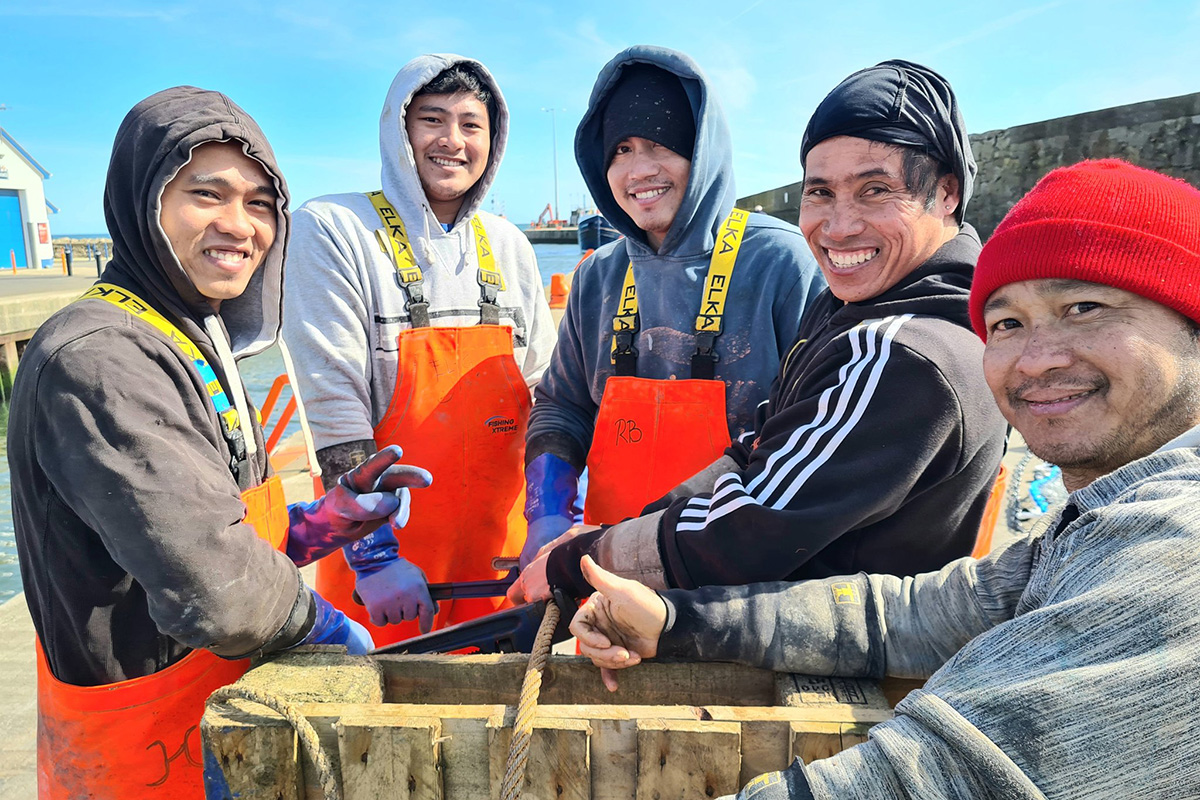
Foreign crew working on gear on the quay at Kilkeel. The Home Office changes to crew visa regulations put their jobs – and the viability of large sections of the Northern Ireland industry – at risk. (Photo: Leslie Campbell
The industry met with the MCA at the start of the month to discuss ML5 concerns, but the NFFO’s Charles Blyth told FN that he was ‘disappointed at the lack of tangible progress’.
Defra secretary Thérèse Coffey again ruled out further investigation of the North East shellfish die-offs – despite continuing evidence of stocks being impacted. Later in the month, she compounded her unpopularity by refusing to meet affected fishermen.
It emerged that sections of the pelagic industry had launched legal action against the Scottish government’s new economic link requirements, under which vessels will be obliged to land 55% of their catches into Scottish ports by 2025.
Cornwall IFCA’s proposed netting byelaw was scrapped after Defra failed to approve it, to the relief of inshore netters who had said it would put them out of business.
The first spurdog landings were made at ports as far apart as Newlyn and Lerwick following the reopening of the fishery.
A reception was held at Fishmongers’ Hall to mark the retirement of NFFO CEO Barrie Deas after 38 years with the federation, and a new era began as former deputy CEO Mike and questioned its finding of Cohen took the helm.
May
A new big story hit the headlines with the revelation that the MMO has suspended approval of two of the four previously approved iVMS terminals for English under-12m vessels, leaving hundreds of fishermen in limbo. After three weeks of stalling by Defra, the two terminals were finally delisted at the end of the month – but it would be August before the next steps became clear.
As preparations were made to raise the wreck of Jersey trawler L’Ecume II, divers recovered the body of skipper Michael Michieli. The following week, the wreck was raised – but in pieces, making it likely that little new information would be garnered from the recovery operation.
Irish industry leaders expressed alarm at the Bord Iascaigh Mhara report for 2022, which showed a drop in landings and questioned its finding of higher prices. Irish South and West FPO chief executive Patrick Murphy said he was ‘mystified’ by the figures in the report. Irish industry leaders also called for the headlines with the a stronger line from the EU pelagic quota shares, particularly in relation to Norway’s access to blue whiting in Irish waters.
The HPMA row at Holyrood escalated, with several SNP MSPs voting against the government’s proposals. Skipinnish’s ‘The Clearances Again’, written in protest against the proposals and featuring Hebridean creel
fisherman and singer Donald Francis ‘DF’ MacNeil, reached number five in the charts.
NUTFA appealed to Department for Transport ministers to grant ML5 exemptions for inshore fishermen, pointing out that MAIB reports record not a single instance of a fisherman’s health having caused an accident at sea.
The winners were crowned at the 2023 Fishing News Awards, with Darren McClements and Richard Grains being named Over-10m Fisherman of the Year and Under-10m Fisherman of the Year respectively, Harvey Buchan winning Young Fisherman of the Year, Boat of the Year being Mark Lovie’s Venture IV and the Lifetime Achievement Award going to Barrie Deas. Over the following two days, a successful Scottish Skipper Expo took place in Aberdeen.
June
A new month began with the positive news that fishing crew had been added to the Shortage Occupation List, allowing them to work on UK vessels via the skilled worker route – but the industry pointed out that
the B1 language requirement remained a barrier to crew actually obtaining the visa.
Crew welfare was thrust into an unwelcome mainstream media spotlight by a Financial Times feature focusing on welfare issues involving a small number of Filipino crew in Kilkeel – which the industry was quick to point out was in no way typical of the industry there or further afield. The following week, it was reported that the industry was working with the SEA Alliance to develop an external welfare certification scheme.
The MMO claimed that fishermen were being ‘supported’ through the iVMS debacle – but with no decisions as to the next steps, fishermen begged to differ. An MMO ‘update’ at the end of the month amounted to: “Wait for further instructions.”
UK fisheries minister Mark Spencer raised the stakes in the Scottish HPMA row by pointing out that designation outside 12 miles would be a matter for Westminster, not Holyrood. This meant that were the Scottish government to persist in its intention of designating 10% of Scottish waters, an impossible 51% of inshore waters would be closed to fishing.
The UK reached a ‘quota for access’ deal with Norway that drew mounting criticism as realisation dawned that the pelagic quota Norway had swapped had been unilaterally issued, over and above scientific advice.
June ended with reports of unprecedented temperatures in the North Sea, with alarming implications for fish stocks.
July
The month opened with confirmation that the Scottish government had scrapped its HPMA plans. Scottish industry leaders responded by saying it was vital that this was a genuine change of policy – not simply the preface to a rebrand.
A deluge of announcements from Defra on a single day in July saw the first six Fisheries Management Plan consultations launched, alongside four further consultations, including ones on REM and discards policy, as well as the release of £45.6m-worth of funding under the UK Seafood Fund. This was a boon for FN page planning at a time of year when news stories are normally few and far between – if not for an industry already response by the start of October.
The UK’s first bluefin tuna fishery was confirmed, with 10 boats licensed to take part in the landmark trial fishery.
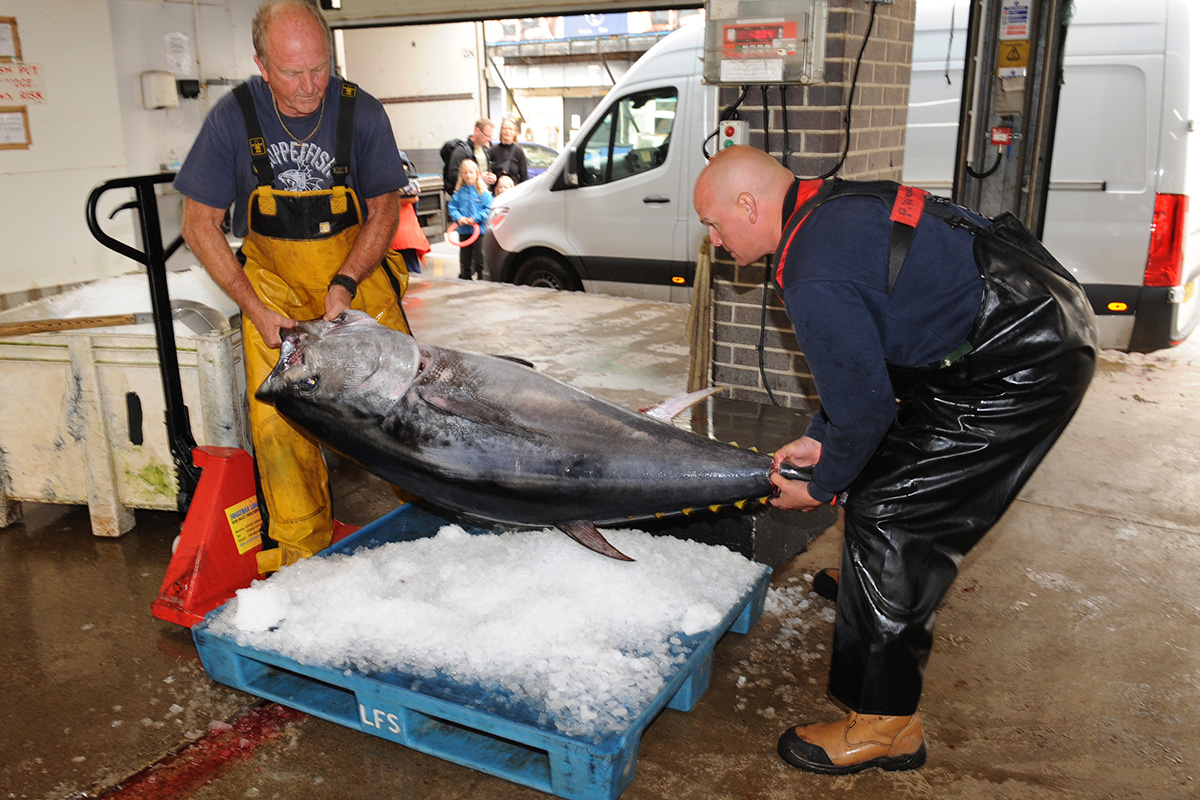
David Bond and Dave Gorring landing a bluefin tuna caught by Mystique II FY 869, one of the 10 boats licensed to take part in the landmark pilot commercial fishery, to Newlyn market. (Photo: Phil Lockley)
August
A border force raid on three Ardglass prawn vessels marked a shock escalation of the cre visa crisis, and the new ‘zero tolerance’ approach to vessels with crew on transit visas working inside 12 miles.
A report separating landings by inshore and offshore shellfish vessels to North East ports – something Defra had notably failed to do in its ‘analysis’ of the impact of the shellfish die-offs – made bleak reading, revealing the extent to which inshore vessels had been impacted.
The MCA issued a prohibition notice to a Seahouses potter because 14-year-old Zeddy Addision, doing work experience onboard during his school holidays, was judged to be ‘working’, highlighting the authorities’ very mixed messaging to aspiring young fishermen.
The ML5 debate intensified, with reports that fishermen were failing their medicals on grounds such as high BMI – and that no account was being taken of modifications they had made to make single-handed operation safer for their particular circumstances.
Another simmering MCA row was reignited by the revelation that notices of prosecution were being sent to fishermen alleged to have been seen on deck without PFDs, on the basis of photographs taken by spotter planes.
A new timetable for English iVMS roll-out was finally confirmed. North of the border, it was confirmed that REM would be introduced for all scallopers and pelagic vessels in Scottish waters, and plans were announced for electronic tracking for all under-12s in Scottish waters.
September
It emerged that the Department for Transport was in breach of its own legislation by failing to publish reviews of said legislation by the statutory dates. The NFFO issued a public plea to transport minister Mark Harper to talk to it about ML5 concerns – two months after he had promised in parliament that he would do so.
Representatives of parts of the Scottish pelagic fleet were back in court arguing against the new economic link requirements. Meanwhile, the row about pelagic quota shares escalated, with growing criticism of the UK’s deal with Norway earlier in the summer.
ICES issued advice for a 16.6% cut for North Sea cod in 2024, despite a positive outlook for the northern stocks, following the adoption of a new principle for stock assessment and uncertainty about the level of mixing between sub-stocks. NGO Blue Marine issued a threat of legal action against Defra in the new year if 2024 TACs were set above scientific advice.
The ‘disastrous’ failure of the UK’s latest auction round to attract any bids for offshore wind developments raised questions about the future direction of renewable energy development.
Defra ratified the Southern IFCA netting byelaw, dashing the hopes of inshore netters in the district.
Sixty-nine-year-old creel skipper Sandy Alexander lost his life after his lobster boat Lexi Rose capsized off Macduff.
The first recruits to the South Western FPO’s groundbreaking apprenticeship scheme began their journey into the industry.
October
The UK fisheries statistics for 2022 were published, revealing that while landings and prices were up last year, profits were down – and that the number of fishermen working in the UK industry had fallen to just 10,000.
The next batch of FMPs were confirmed, with five more consultations due to launch before the end of the year – and a further 25 lined up for 2024.
ICES advice for pelagic stocks in 2024 recommended a 24% cut for herring – though with the coastal states no nearer to an agreement on quota shares, all indications were that this would remain merely a recommendation.
The Manx herring fishery reopened after many years, following the transfer of quota to the island following the Brexit TCA.
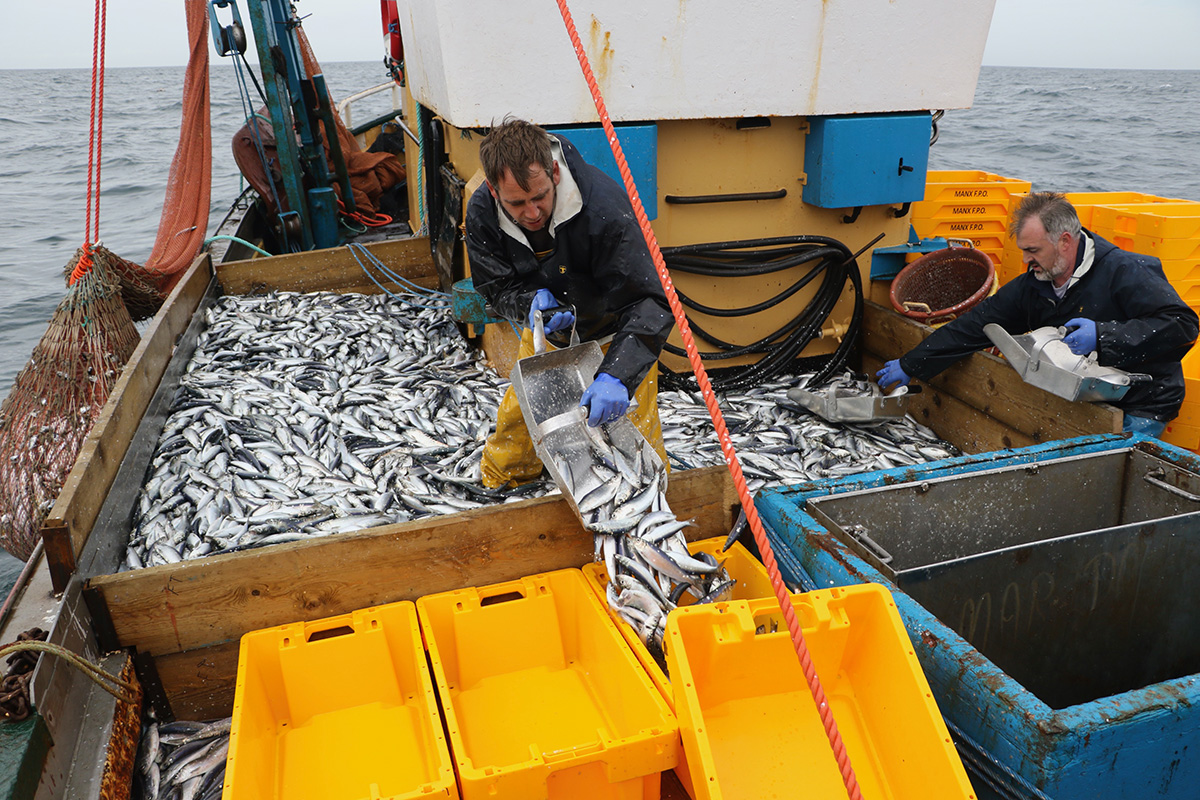
Marshall Thompson and Jon-Jo Skilen boxing up herring on the Marida after the historic reopening of the Manx fishery. (Photo: Darren Purves)
A crewman, whose name was not released, lost his life in an accident on the scalloper Honeybourne III off the Sussex coast.
The announcement of a new round of UK Seafood Fund Awards included £3m for a Scottish Seafood Centre of Excellence in Fraserburgh, work on which will begin in the new year.
November
It was announced that harbour masters – volunteered by the MCA to vouch for fishermen’s fitness without, apparently, having been asked – would no longer be able to help fishermen to obtain ML5s. Transport minister Mark Harper finally kept his promise to meet the industry to discuss ML5 and other concerns – but the promised ‘review’ did not include any timeline.
As the days ticked down to the 30 November deadline, and the deafening silence from the Department for Transport continued, calls for a delay to ML5 implementation intensified, with the NFFO joining calls
for a freeze. As the month drew to a close, NFFO chief executive Mike Cohen told FN: “Sometimes, when you say nothing, you send a very clear message. I don’t think I like the message the MCA is sending to fishermen here.”
Northern Ireland welcomed its first skilled worker visa crew – but news emerged of more crewmen on the west coast of Scotland having been deported, after being found working inside 12 miles on transit visas. A multi-agency raid saw 60 officers descend on a small Luce Bay lobster business suspected of being in breach of crewing regulations.
It emerged that a substantial portion of the English under-12m fleet had yet to commit to iVMS installation, with that deadline also looming, highlighting the number of inshore skippers with serious doubts about their future in the industry.
The North Atlantic Pelagic Advocacy Group raised the stakes in the pelagic quota shares saga by threatening a boycott of North East Atlantic fisheries if coastal states could not agree shares in line with scientific advice for 2024.
The UK cabinet reshuffle saw change at the top of Defra, with Steve Barclay replacing the unlamented Thérèse Coffey, and a new maritime minister, with Lord Davies replacing the equally unlamented Baroness Vere.
A new Cefas test found pyridine ‘very unlikely’ to have been the cause of the North East shellfish die-offs – a conclusion disputed by Dr Gary Caldwell of Newcastle University, who has been working with the North East Fishing Collective.
The SNP unveiled its plan for fisheries under (entirely hypothetical) independence – including rejoining the CFP.
The SFF celebrated its 50th anniversary with a dinner at Edinburgh Castle.
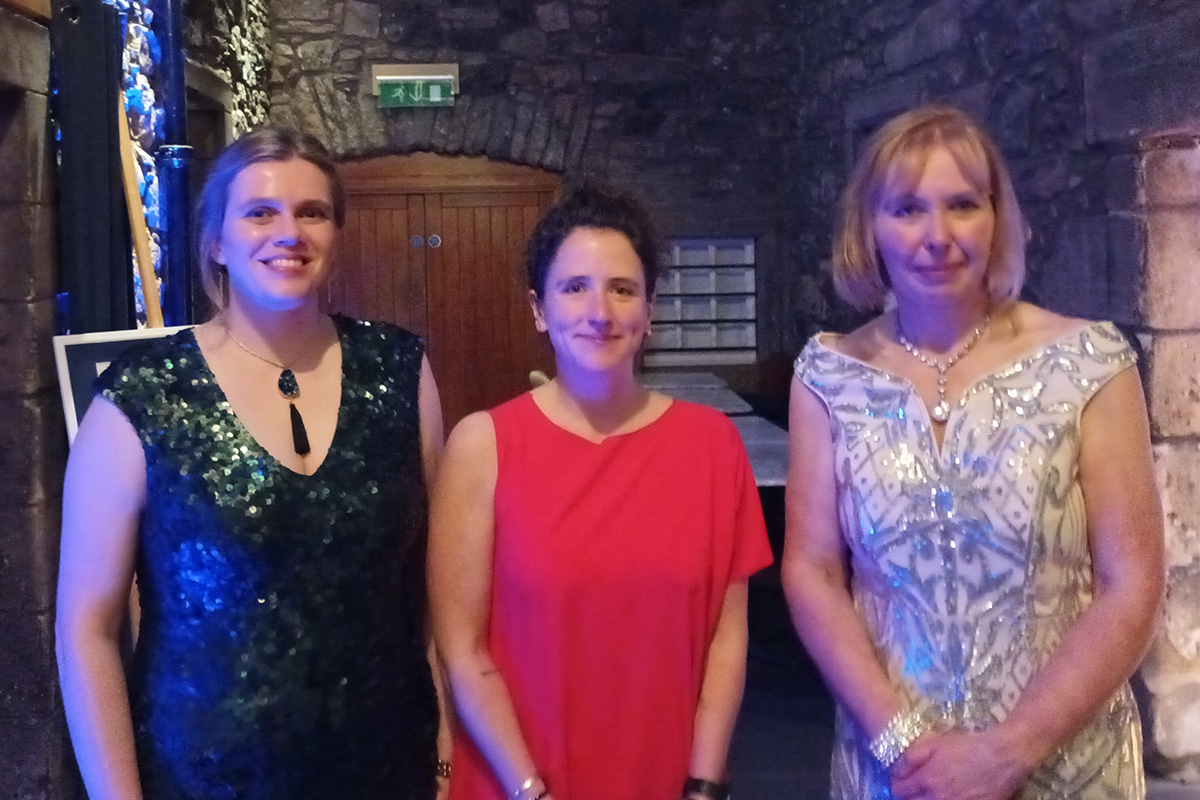
Incoming SFF president Hannah Fennell, Scottish cabinet secretary for rural affairs Mairi Gougeon and SFF chief executive Elspeth Macdonald ahead of the federation’s 50th anniversary dinner in November.
December
It was reported that the MCA had, finally, made limited changes to the ML5 requirements – just 30 hours before the deadline.
The changes were described by NFFO chief executive Mike Cohen as ‘far too little and far, far too late’. For some fishermen, the changes brought relief; others remained in limbo, or faced the prospect of having to go through the whole certification process again in 12 months’ time.
Vessels dependent on overseas crew were dealt a new blow by the government’s announcement of a 50% hike in the minimum salary for skilled worker visas.
The row over Rockall access – and indeed ownership – reignited with the release of Scottish government papers and a statement from Sinn Féin that it might be ‘much more forceful’ on the issue if it led the next Irish government.
The year concluded, as it had opened, with the announcement of TACs for the coming year – agreed, this year, in time for the EU December Fisheries Council (and the press deadline for the final issue of FN). This neat piece of bookending was doubtless more appreciated in the North East, where the TACs have been largely welcomed, than in the South West, where the zero pollack TAC headlined disappointing results. Once again, the prospects for the new year are very mixed.
This story was taken from the latest issue of Fishing News. For more up-to-date and in-depth reports on the UK and Irish commercial fishing sector, subscribe to Fishing News here or buy the latest single issue for just £3.30 here.
Sign up to Fishing News’ FREE e-newsletter here.

